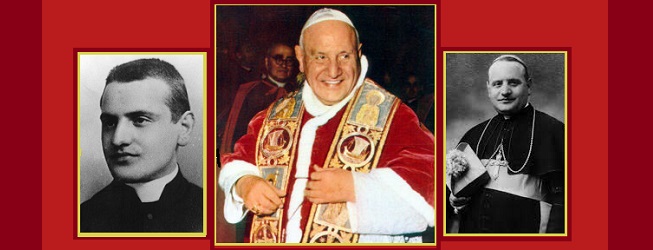The firstborn son of a farming family in Sotto il Monte, near Bergamo in northern Italy, Angelo Giuseppe Roncalli was always proud of his down-to-earth roots. In Bergamo’s diocesan seminary, he joined the Secular Franciscan Order.
After his ordination in 1904, Fr. Roncalli returned to Rome for canon law studies. He soon worked as his bishop’s secretary, Church history teacher in the seminary, and as publisher of the diocesan paper.
His service as a stretcher-bearer for the Italian army during World War I gave him a firsthand knowledge of war. In 1921, Fr. Roncalli was made national director in Italy of the Society for the Propagation of the Faith. He also found time to teach patristics at a seminary in the Eternal City.
In 1925, he became a papal diplomat, serving first in Bulgaria, then in Turkey, and finally in France. During World War II, he became well acquainted with Orthodox Church leaders. With the help of Germany’s ambassador to Turkey, Archbishop Roncalli helped save an estimated 24,000 Jewish people.
Named a cardinal and appointed patriarch of Venice in 1953, he was finally a residential bishop. A month short of entering his 78th year, Cardinal Roncalli was elected pope, taking the name John after his father and the two patrons of Rome’s cathedral, St. John Lateran. Pope John took his work very seriously but not himself. His wit soon became proverbial, and he began meeting with political and religious leaders from around the world. In 1962, he was deeply involved in efforts to resolve the Cuban missile crisis.
His most famous encyclicals were Mother and Teacher (1961) and Peace on Earth (1963). Pope John XXIII enlarged the membership in the College of Cardinals and made it more international. At his address at the opening of the Second Vatican Council, he criticized the “prophets of doom” who “in these modern times see nothing but prevarication and ruin.” Pope John XXIII set a tone for the Council when he said, “The Church has always opposed… errors. Nowadays, however, the Spouse of Christ prefers to make use of the medicine of mercy rather than that of severity.”
On his deathbed, Pope John said: “It is not that the gospel has changed; it is that we have begun to understand it better. Those who have lived as long as I have…were enabled to compare different cultures and traditions, and know that the moment has come to discern the signs of the times, to seize the opportunity and to look far ahead.”
“Good Pope John” died on June 3, 1963. St. John Paul II beatified him in 2000, and Pope Francis canonized him in 2014.

